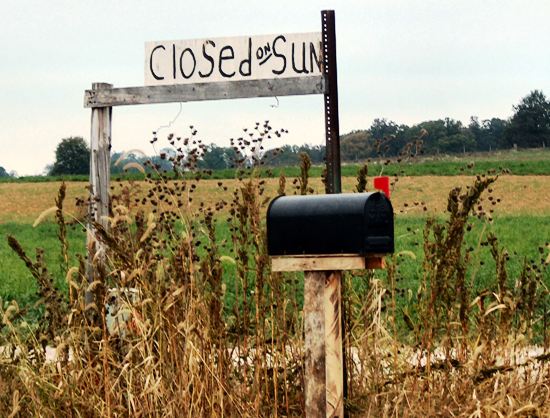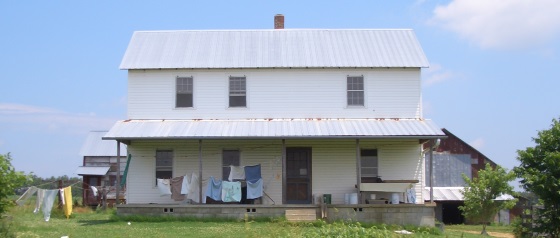Abner the Bookbinder
Last week, an excerpt from The Amish Way mentioned a gentleman named Abner, a deceased Amish historian whose trade was bookbinding.
Abner was apparently quite a remarkable person who touched a lot of people in his community. Brad Igou (The Amish in Their Own Words) knew Abner well and has shared some remembrances which he recorded after Abner’s death in 2002:
A good friend has passed. He happened to be Amish. What brought us together was a recipe for cornmeal pancakes. It was over 15 years ago, on a day when various buildings were open for a one day historical tour near the Hans Herr House. One of the buildings opened for visitors was a “double-decker” Amish barn. As you entered, you were greeted by one of two Amishmen, who gave you a brief explanation. Of course, general conversation ensued. At that time I was working in the mill at Mill Bridge Village. I mentioned that we did grind corn into cornmeal, but mainly for demonstration. Foods using cornmeal came up in the conversation, and I mentioned cornmeal pancakes. That interested him, and I said I’d drop off the recipe and some cornmeal if he told me where he lived.
He was a bookbinder, just outside the village of Intercourse. At the time, the local Amish library was housed in his home. Somehow, in the course of our conversation when I stopped by, I was invited to see the books. I noticed all the back issues of Family Life, the Amish magazine published in Canada. I had been thinking for some time of compiling a book of writings from the many years of magazines, but did not know where to find all the back issues. I mentioned this, and was invited to come and read them.
I took him up on the invite. Wednesday nights were my “Abner nights.” I would stop by after work, read until I was getting sleepy, writing down the parts I liked. After I was finished, he offered something to drink and a snack, and we would sit and talk. And so, over the course of weeks, months and years, our friendship grew.
—
We would sometimes sit on the porch, or in the house, and talk until it got dark. He enjoyed being read to in later years, as his eyesight became worse, and especially enjoyed the funny stories and jokes from the Old Country News publication to which he subscribed. It was sometimes amazing how our conversation would roam…from one thing to another. Some evenings we’d ponder how we started talking about one thing and ended up in such a totally different place. He also enjoyed the pop-up books I collect, and we would go through one from time to time. We sometimes sat and watched as thunderstorms spread across the landscape. And we sometimes enjoyed “Amish movies,” what he called the shadows moving across the side of the house as cars drove by.
Snack favorites included his own garden mint tea, an occasional root beer float (or visit to Lapp’s for ice cream), apples with peanut butter, and crackers and pretzels. There was often candy or something else another visitor had left. I joked with him about his fondness for fruit “bruckle,” which I referred to as fruit with soggy bread in milk. He also liked “TV dinners,” meals he made up in trays, froze, and then ate warmed in the oven. I told him they could become a hot item commercially — Amish TV Dinners.
We also enjoyed watching lightning bugs, the sun setting in the valley behind his house, the clip-clop of horses going by, and the evening primrose, a plant whose flowers open in a matter of seconds around sunset.
Abner had so many friends, both Amish and “English.” He loved to talk and “visit,” and his knowledge of genealogies and the library, made him a resource many people sought out, both here and from abroad. When no one knew who to take a visitor to see who wanted to talk to an Amish person, Abner was often “the one.” He was accessible yet firmly rooted in his Amish faith. The author of just about every major book on the Amish asked him to look over their drafts and make suggestions. Abner was also a good source to introduce you to other people that might be able to help you more than he could. Many projects would never have come to fruition without his help.
But all who came, for whatever reason, fell in love with the man. One friend remembered the “twinkle in his eye.” His knowledge, his warmth, his sense of humor, his delight in talking and visiting and meeting people. Even in his 80’s, he remained enthusiastic about the things he enjoyed. He always had planned something to do when we went to the library in these last few months. While I read, he was doing something. He kept coming up with things that “needed to be done.” He felt so strongly about preserving anything and everything having to do with the Amish. He went to auctions to get books for the library and just for the fun of it and to see what prices things would bring. (He loved auctions, too, because of all the people he would meet.) While many local Amish may not see the importance of preserving artifacts and books of their local history and heritage, Abner was one who did, and who encouraged a new generation to do so.
Because he knew of my interest in learning about the Amish, he would often share information with me, and would always try to answer my questions. One of our projects was collecting Amish nicknames and, where possible, the usually humorous stories behind them. I had scheduled to print the short article I wrote in the winter issue of Amish Country News. It seems even more fitting now that he’s gone.
Abner was never judgmental with people about their religion. You never felt that he was trying to make you Amish. Thus, you could talk to him comfortably. There were never arguments. He had tremendous curiosity about everything, including other religions. Yet he seemed totally secure, with great conviction, in his Amish faith. He could certainly talk about problems and people who were not the best example of living their faith, as is the case in any church. But it was not with meanness, more of a polite criticism about something he probably could not change. In many ways, Abner encapsulated what was good about the Amish way of life. Through him many came to understand and respect it. He was a good example.
When asked once what the biggest challenge facing the Amish today was, he said, “prosperity.” I asked him once what it meant to be Amish. He had to think a while (it is a tough question for anyone), but then had some thoughts.
One of his favorite expressions, which I will always remember him for, could often be heard when he’d say how he was slowed down because of some malady, how he couldn’t do this or that, etc. Then he would say, “I’m not complaining, just explaining.”
—
What did I learn from Abner? So many things. The same things that brought people back to visit him on a regular basis, over many years. Just the joy in conversation. It’s so simple, really. Someone who enjoyed listening to you talk, and who enjoyed offering his perspective. Even my friends from Costa Rica wrote about how much they enjoyed meeting him, and talking, and going for ice cream. Those who met Abner know of that unique personality he had.
I called him “my psychiatrist.” He was a great “listener.” He really seemed focused on whatever you said, often adjusting his hearing aid, or sitting you beside his good ear. No matter what seemed to be happening in my life, when I stopped in and we started to chat, it all seemed to disappear. That was from my world, and now I was in his. We shared a little of each of our worlds, to be sure, but most of the time he seemed more comfortable in his than I did in mine. Satisfaction and contentment did not depend on “things.” People and friendship, faith and family — these were the foundations of Abner’s world. When you were with him, you became a part of them. There are probably hundreds of people, whose only connection is having known Abner… It is a special group of people, and they know there were privileged to be part of Abner’s very large “circle.” Many were the people who first came to Abner purely because he was Amish….a contact, a lead. But for so many, he then became a friend.
Sometimes we would travel by car to visit another Amish friend of his, or on an “errand,” or to get groceries, or just to drive around the countryside on a beautiful summer afternoon. Just days before another friend of his passed away, we went to visit. It seemed we might not have another chance. While he talked in the dialect privately, I talked to the man’s wife. Then I spent a few minutes with the man, who lived not far from my office. He was not well and, looking at me said peacefully, “I’m ready to go home.”
It was a privilege to be invited to Abner’s funeral, an experience of great emotion and sadness, mixed with some curiosity and awkwardness about the customs. I thought about this very unusual mix of people that one man had brought together, and many more who would only find out about Abner’s death in the newspaper that day. Many people who did not know each other, from very different worlds, all of whom had the “Abner connection.” Each had received something special from Abner’s friendship. He had brought them all together, at long last, to bid him farewell. In an odd way, that I believe he would have fully understood and enjoyed, it was his final gift. He wanted us all there with him. Perhaps that’s why he looked so at peace. I’m quite sure he was smiling. With his family and friends around him, Abner was finally “going home.”






Abner is an example for us all. What a rare priveledge to have known such a person.
What a wonderful man and how I would love to have had the honour of talking with him. I too have so many questions about the Amish and their way of life.
How blessed you and Brad (et al) to have known this man. What a ‘wonderful gut’ thing it is to share ourselves in this way. Thanks for sharing and for the reminder of how we can touch one another’s lives in simple ways. I cherish friendships like these. This reminds me to stop, slow down, remember what is really important, and take time to act on it – and just ‘be’ with someone else.
What a wonderful story. I would like to have known Abner.
Abner sounded like a real special person and friend. I, too, wish I had known him.
Sure enjoyed your article about Abner. There are special people we meet sometimes on our journey through this life that we learn so much from, connect in special ways, and will never forget. Mine have mostly left this world . . . But with your story I have renewed hope that there will be more before I pass on.
Being a bookbinder, and one who respects the Amish way of life, I found this article deeply interesting.
Thank you for sharing this.
Richard
Glad everyone has enjoyed this piece and many thanks to Brad for sharing it.
Thanks to those who commented about my remembrance of Abner. Erik said he had a request for my corn meal pancake recipe, which I now have… Sift together 3/4 cup flour, 1&1/8 tsp. baking powder, 1 tbsp. sugar, and 1/4 tsp. salt. Add 1/2 cup cormeal and mix well with 1 tsp. nutmeg and 1/2 tsp. soda. Combine one egg well-beaten with 3/4 cup milk. Add to dry ingredients, mixing well. Add 2 tbsp. melted butter or shortening. Bake on hot greased griddle. Makes about 10 pancakes.
Brad many thanks for sharing this recipe with us too. I hope someone will make them and let us know how they turn out. Sounds tasty!
Having been overseas for five weeks, I have been working back through your recent Amish America postings and came upon Brad Igou’s wonderful tribute to Abner B. Abner was indeed special to everyone he met. He was the man who arranged home stays with Amish families the first time we taught the Amish cross-cultural course at Messiah College. He befriended one of our graduates, Mark Wassler, who became, according to Abner, one of his dearest friends. Of course, he encouraged Brad in his Family Life project. While I was working on my book, he talked with me about his adolescence in Lancaster County in the 1940s and his experience with the Chow-chow gang: “We were really a mixture,” he explained. We were all saddened by his death, reputedly from the West Nile virus. Hundreds gathered to mourn his passing. I feel privileged to have known Abner also–a wonderful, grace-filled Christian brother. Richard Stevick rstevick@messiah.edu P.S. Brad’s tribute was also spot-on and lovely. BTW, Brad is the only English person I know who has ever attended an Amish ordination service. Ask him about it if you see him at Amish Experience in Lancaster County.
I met Abner when we first moved from Pittsburgh to Lancaster County. We worked together at Zimmerman’s Grocery Store in Intercourse and he was the person who introduced me to one of the Amish school directors. We became good friends and spent many evenings watching the night blooming primrose, drinking home made root beer and eating grapes off the arbor. His wife was a wonderful woman who shared the same “twinkle” in her eyes that Abner had. So many of the experiences that Brad shared were similar to ones that we had.
Abner loved playing practical jokes. We used to take the Mormon Elders to visit him. On the way to one visit, we told the elders about this beautiful Cindy that lived in the apartment next to Abner. They wanted to meet her and Abner told them all about her long brown hair, beautiful long eyelashes and long shapely legs. By this time one the young men was straightening his collar and trying to make himself more presentable to Cindy. So Abner invited him into Cindy’s apartment to meet her. And there we were in the forebay of the barn with beautiful Cindy hanging her long brown hair over the stall door waiting for Abner to give her a treat. Of course, Cindy was his horse! The first time we played this trick, Abner thought it was great fun and with other visitors he talked with more detail about Cindy. I can still see the twinkle in his eye as he opened the door to visit Cindy! We of course, we have a good laugh and then some root beer or meadow tea and eat pretzels!
I had to smile when I read of Abner’s Amish TV dinners. And the funny stories and jokes he used to tell. He was a man who loved to be around people, to teach them and to learn from them. He reminded me at times of a child, so eager to learn new things. And he taugh me so much about life and living.
My life was richly blessed because Abner and Katie were in my life.
This was a great article. Thank you, Erik.